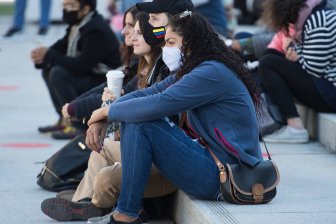At the Pharmasave in Kelowna, B.C.’s Glenmore area, some shelves that would normally be filled with over-the-counter medications to treat symptoms of the flu and other respiratory illnesses are fairly sparse.
“Flu medication sales are crazy to put it mildly,” said owner pharmacist Craig Tostenson.
With an abnormally-high demand for medication this flu season, manufacturers are struggling to keep up.
“Since it’s a really harsh flu season that sales, the demand is going to continue,” Tostenson told Global News.
Read more:
21 cases of XBB.1.5. COVID subvariant confirmed in Canada
Read next:
Teacher shot by 6 year old student in Virginia classroom: police
This year’s flu season is being described as vastly different from years past.
“It has started earlier and it has been more prominent,” said Dr. Fatemeh Sabet, medical health officer with Interior Health (IH).
The surges in COVID-19, influenza, and respiratory syncytial virus (RSV) have health experts calling this a “tridemic” — a triple threat that is putting strain on health care.
“We have seen an increase in different respiratory infections at the same time this year,” Sabet said. “It is something that we were not seeing at this level during the years before the pandemic.”

In the Interior Health region, while November and December saw the peak in terms of the number of cases, IH said respiratory illnesses are still having a big impact.
“We continue to see respiratory infections at a high level,” Sabet said.
After being the main culprit early on in the season, Sabet said influenza numbers have declined.
However, that’s not the case with RSV and COVID.
“The number of RSV infections are increasing, the number of COVID infections are slightly increasing,” she said.
While severe outcomes like hospitalizations and deaths are currently stable, according to IH, there are people who need to be extra careful.
“Individuals who are older or younger population, infants younger than six months of age and individuals with underlying medical conditions,” Sabet said. “So it is more important for these individuals to be aware that respiratory infections continue to be circulating.”
Read more:
‘Nothing is available’: Pharmacies experiencing shortage of adult cold and flu medication
Read next:
Taliban respond to Prince Harry’s claim he killed 25 soldiers in Afghanistan
Sabet urged the public, and especially the vulnerable population, to take steps to protect themselves.
“The best thing that we can do is to be up to date for our vaccines,” she said. ” Staying home when you’re sick or when you have any symptoms of respiratory infection and also follow hygiene measures like hand-washing or avoiding touching your face, sneezing or coughing into your elbow and wearing masks in case it is needed.”
IH said the Omicron variant continues to be the most dominant strain of COVID-19 that’s circulating within the health region. Health officials are now keeping an eye on the new version of it, the XBB1.5 subvariant.
While IH said most of the cases in B.C. are in the Lower Mainland, the health authority said it’s likely it’s only a matter of time before this region is impacted.
“Considering our previous experiences of circulating respiratory infections. Interior Health follows the number of cases in the Lower Mainland,” Sabet said. “So we are expecting to an increase in the numbers here too.”

© 2023 Global News, a division of Corus Entertainment Inc.

























Add Comment